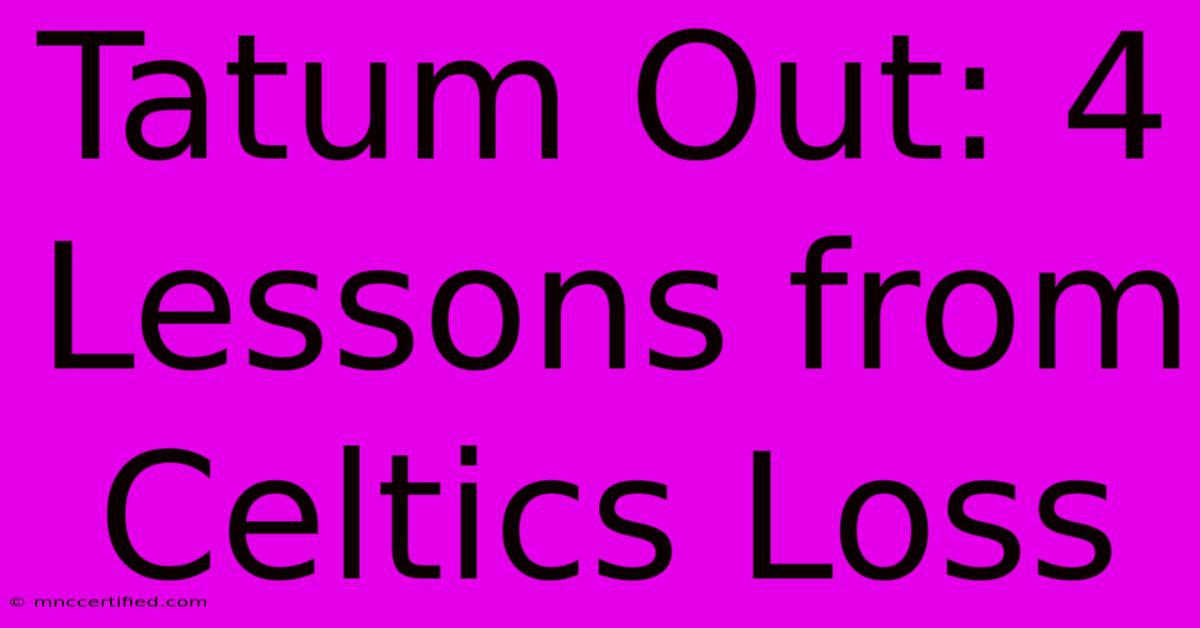Tatum Out: 4 Lessons From Celtics Loss

Table of Contents
Tatum Out: 4 Lessons from the Celtics' Devastating Loss
The Boston Celtics' recent loss, played without Jayson Tatum, served as a harsh but valuable lesson. While the absence of their star player undoubtedly contributed to the defeat, the game revealed deeper issues within the team's strategy and performance. Let's dissect four key takeaways from this crucial game.
1. Offensive Vulnerability Beyond Tatum: The Need for Diversified Scoring
The most glaring takeaway is the Celtics' over-reliance on Tatum's scoring prowess. His absence exposed a critical vulnerability: a lack of consistent offensive firepower from other players. While players like Jaylen Brown stepped up, the overall offensive flow felt stagnant and predictable at times. This highlights the urgent need for offensive diversification. The team needs to develop more reliable secondary scoring options and improve their ability to generate points from various sources, not just relying on one superstar. This involves improving ball movement, developing more off-ball plays, and empowering role players to take more initiative. Developing consistent secondary scoring is crucial for playoff success.
Improving Ball Movement and Player Empowerment
The Celtics need to focus on drills that enhance ball movement and player confidence. Practice sessions should incorporate scenarios simulating Tatum's absence, forcing other players to assume leadership roles and take more shots. This requires coaching adjustments and a shift in team mentality, fostering a shared offensive responsibility rather than dependence on a single player.
2. Defensive Gaps Exposed: Vulnerability Without Tatum's Defensive Presence
Tatum's absence also impacted the Celtics' defensive performance. His defensive versatility and ability to guard multiple positions were noticeably missed. Opponents exploited these defensive gaps, leading to higher scoring opportunities. The loss highlighted the importance of a robust, cohesive defense that doesn't rely solely on one player's ability. Strengthening the collective defensive unit is non-negotiable.
Strategic Adjustments and Defensive Drills
This necessitates refining defensive strategies, focusing on better rotations, communication, and individual player improvement in defensive positioning and one-on-one defense. Targeted defensive drills focused on covering for absences and anticipating offensive plays are essential.
3. Bench Production: Inconsistency Remains a Major Concern
The Celtics' bench production has been inconsistent throughout the season, and this game was no exception. While some players showed flashes of brilliance, the overall output from the bench was insufficient. Consistent bench production is paramount for sustained success, particularly during intense playoff games where fatigue is a major factor. The team needs to find a reliable rotation of bench players who can consistently contribute on both ends of the court.
Addressing Bench Inconsistencies: A Coaching Challenge
This demands a thorough evaluation of bench player performance, identifying strengths and weaknesses, and implementing strategies to maximize their contribution. This may involve refining the bench rotation, providing more playing time for consistent performers, and implementing specialized training to address specific weaknesses.
4. Mental Fortitude: Handling Adversity and Maintaining Focus
Perhaps the most intangible lesson lies in the team's mental approach. The absence of Tatum inevitably impacted team morale and focus. The loss underscores the importance of maintaining mental fortitude in the face of adversity. The Celtics need to develop resilience and the ability to overcome challenges without their star player.
Building Mental Resilience: Team Building and Psychological Training
This requires dedicated team-building exercises, fostering a stronger team spirit and shared responsibility. Incorporating psychological training to enhance focus, resilience, and mental toughness can also significantly improve the team's ability to cope with setbacks.
In conclusion, while the Celtics' loss was undoubtedly disappointing, it provided valuable insights into areas needing improvement. By addressing these four key areas – offensive diversification, defensive solidity, consistent bench production, and mental resilience – the Celtics can emerge stronger and better prepared for future challenges. This loss, while painful, can serve as a catalyst for growth and a springboard to future success.

Thank you for visiting our website wich cover about Tatum Out: 4 Lessons From Celtics Loss. We hope the information provided has been useful to you. Feel free to contact us if you have any questions or need further assistance. See you next time and dont miss to bookmark.
Featured Posts
-
Open Stores Christmas Day A List
Dec 24, 2024
-
Niu Vs Fresno State Predictions And Betting Odds
Dec 24, 2024
-
Squid Game 2 What Happened
Dec 24, 2024
-
Josh Jacobs Nfls Elite Rb Return
Dec 24, 2024
-
Sevilla Loss Real Madrid At Number Two
Dec 24, 2024